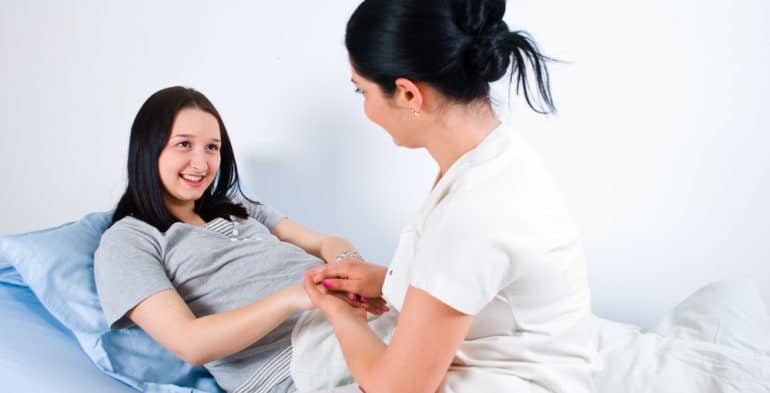
Recovery from Caesarean section
A Caesarean section is a common operation but it is worth remembering that it is also quite a serious one. It is major abdominal surgery in which the surgeon cuts through your abdomen and uterus in order to deliver your baby. If you had abdominal surgery of this type for other reasons than childbirth then it would be reasonable to expect you to take your time to recover and rest. This is not so easy for a new Mom and balancing caring for your new baby and taking the time you need to recover safely from your C- section can be tricky. You can read more about what is involved in a Caesarean section here http://baby-arabia.com/en/what-happens-during-caesarean-section/
The first few days after a Caesarean section
You will expect to remain in hospital for three to five days after a C-section and will be under the care of hospital staff.
You will be feeling mixed emotions euphoria, tiredness and discomfort. Many of the symptoms of a newly delivered mother you will also experience such as engorged breasts, vaginal bleeding and fatigue; however you will also have the challenge of recovering from abdominal surgery.
Here is what to expect after a Caesarean section
You may feel a little disorientated from the pain relief given to you during and immediately after delivery. Drugs used in pain relief, particularly morphine which is very effective, may also cause you to feel itchy.
The IV and urinary catheters will be removed usually within 12 hours and soon after this you will be encouraged to stand and move around. Make sure you do not try to do this without assistance to start with. Movement is important as it will help to prevent the risk of post-surgery blood clots and also help your digestive system return to normal which will make you more comfortable. You will find that due to the disturbance of the surgery and the drugs used you will most likely experience bloating and gas and possibly constipation. If this becomes problematical you can be given medication to help ease the symptoms.
Within six to eight hours of surgery you may be able to drink fluids – and even start eating a light diet if you feel like it – you may feel very hungry or you may have little appetite yet. It is good to try and eat something as soon as you have the go-ahead and fluid intake is vital.
It’s also important to get to the bathroom to urinate regularly. A full bladder makes it harder for the uterus to stay contracted and increases pressure on the wound.
Your doctor will probably remove your sutures or staples on the third or fourth day. This takes just minutes, and you may feel a small pinch but you shouldn’t feel any pain. This is usually done before discharge from the hospital.
You will need help with positioning for breastfeeding to ensure that you are comfortable and there is no pressure on your abdomen.
You will be given safe pain relief to help keep you comfortable but expect to feel some discomfort as your womb retracts and your incision starts to heal.
Going home after a Caesarean Section
Expect to need help and support once you get home from your partner, parents, in-laws, and friends. If you’re worried that you may not have enough support, hire paid help if you can afford it.
You must not lift heavy items such as shopping or younger children when you get home; you may even need help lifting your baby to start with in hospital.
You may need prescription painkillers for a few more days after surgery, gradually transitioning to over-the-counter pain relievers. (If you’re breastfeeding, don’t take aspirin or drugs containing acetylsalicylic acid.)
Self-care after Caesarean Section and things to watch out for
Drink plenty of fluids to help you avoid constipation and ask for advice from your doctor if this becomes a problem.
Keep a close eye on your wound which should start to feel better day by day. You should also watch out for infection either of the wound or of your womb or bladder. Signs of infection include:
• warmth, redness, swelling, or oozing at the incision site
• worsening pain or sudden onset of pain
• any fever (even if your incision looks fine)
• foul smelling vaginal discharge
• pain or burning when urinating, the urge to pee frequently when not a lot comes out, or urine that is dark and scanty or bloody
Vaginal bleeding should be diminishing, although it may last up to six weeks. It should gradually turn from bright red to pink and then yellow-white. If menstrual-type bleeding continues past the first four days after delivery or comes back after slowing, call your healthcare provider.
You’ll also need to call your caregiver without delay if you experience severe or persistent pain or tenderness and warmth in one area of your leg, or one leg that is more swollen than the other which may signal a blood clot.
It is important to get plenty of rest once you’re home, but you also need to move about regularly. Movement promotes healing and helps prevent complications such as blood clots.
Don’t overdo it; start your activity gradually. Remember you’re recovering from major abdominal surgery and will feel tender for some time. Avoid heavy household work or lifting anything heavier than your baby for eight weeks.
Driving will also be off limits for up to six weeks. Check with your insurance company to be sure that you are covered to drive safely.
It is common to feel a little frustrated if it seems to be taking you a long time to recover – go easy on yourself – not only are you healing from surgery but your body is also dealing with significant physical and emotional postpartum changes and in addition you have a new baby to care for day and night. It will take time to feel that your body and your life are back to normal but just give yourself time and look after yourself and soon you will be feeling your normal self and enjoying life with your new baby.









